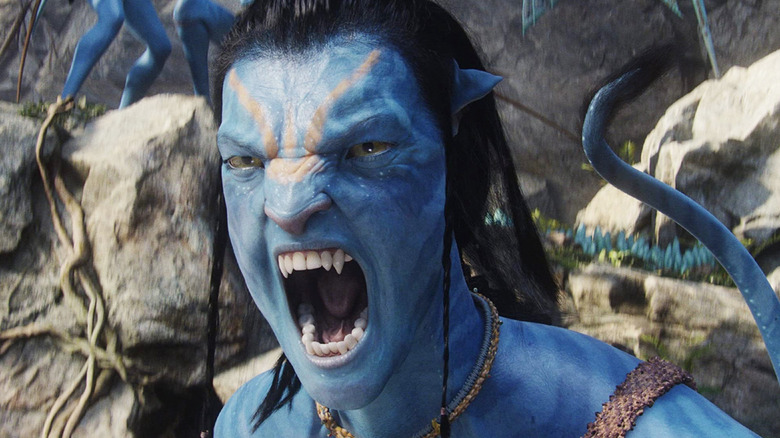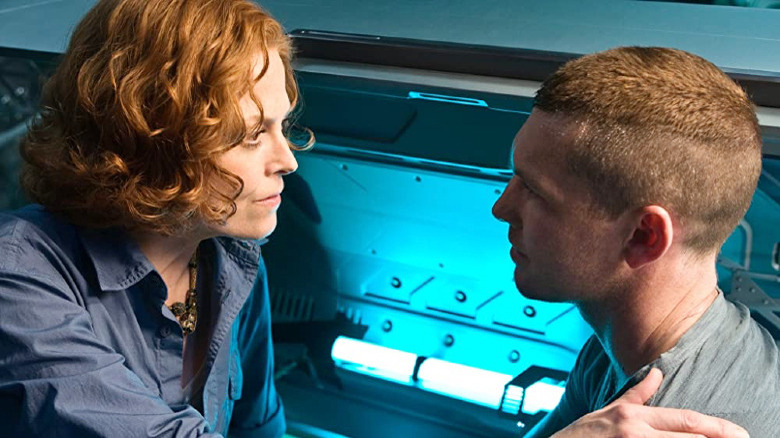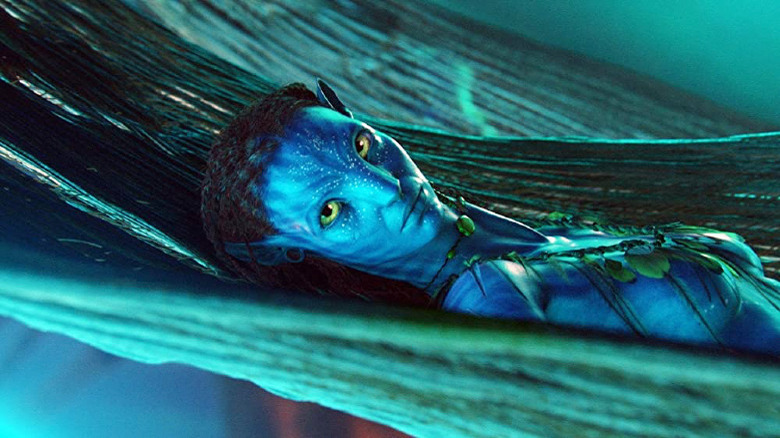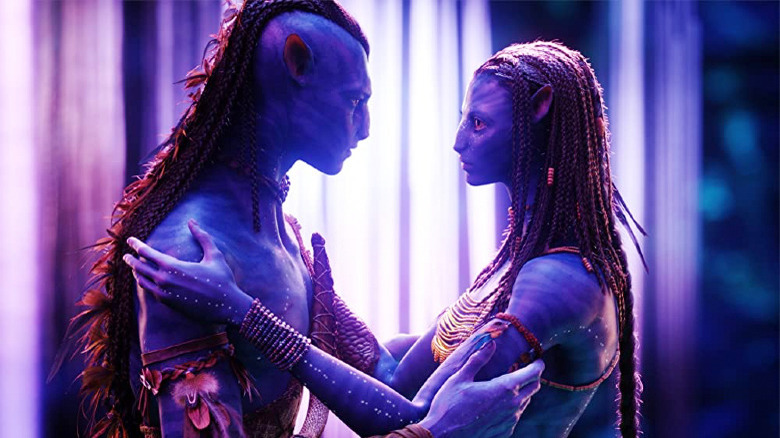How Avatar Became The Most Popular Movie No One Remembers
We may receive a commission on purchases made from links.
If you've been online in the last 13 years, you've very likely stumbled upon people claiming nobody can remember the actual plot of James Cameron's 2009 mega-blockbuster "Avatar," much less the names of the film's characters. Cameron himself certainly has, having bluntly referred to such individuals as "trolls" while promoting his long-awaited sequel, "Avatar: The Way of Water." Yet, it's hard to deny those "trolls" have a point.
It's worth recalling there was a lot of doubt as to whether "Avatar" would even be a hit. Cameron went all-out in promoting the film ahead of its release, screening 25 minutes of footage at the 2009 Comic-Con International in San Diego and declaring August 21 that same year "Avatar Day," with 15 minutes from the movie being shown in theaters free of charge across the U.S. The crux of Cameron's marketing blitz was that "Avatar" is a true experience that couldn't be fully appreciated unless seen in 3D and, preferably, IMAX as he intended. In the words of "Avatar" star Sam Worthington, the film was "designed [to] bring people back to the cinema" at a time when the theatrical experience had already lost some of its luster.
After months of build-up, "Avatar" opened with $77 million in December 2009, topping the U.S. box office. Even more impressively, it fell a scant 2% in its second weekend, despite stiff competition from the likes of Guy Ritchie's "Sherlock Holmes." Cameron's film would continue to hold strong for weeks on end. Fueled by strong word of mouth, it became a must-see event in theaters, capping off with a whopping $2.7 billion gross worldwide (not counting its re-release in 2021).
So far, however, you may have noticed there's something rather important we haven't talked about: What does, in fact, happen in "Avatar?"
So what happens in Avatar again?
The movie, which James Cameron both wrote and directed, takes place in the 22nd century on Pandora, an alien moon that's home to a highly-valuable natural resource (known as unobtanium) that could be the key to solving humanity's energy crisis back on Earth. Sam Worthington stars in the film as Jake Sully, a disabled former marine who travels to Pandora to join a program (dubbed the Avatar Program) dedicated to cultivating peaceful relations between humankind and Pandora's native species, the Na'vi. As a result, Jake is equipped with a genetically-engineered Na'vi body (e.g. his Avatar), which he can control remotely using his mind.
Most of "Avatar" focuses on Jake falling in love with the Na'vi warrior Neytiri (played by Zoe Saldana) and choosing to lead the Na'vi into battle when the human invaders begin to threaten their very survival. Critics were mostly positive on "Avatar" at the time of its release, with Roger Ebert calling it "a technical breakthrough" for CGI and 3D in his four-star review. He also praised its "flat-out Green and anti-war message," although other reviewers would criticize the movie for perpetuating the white savior trope and having ableist overtones in the way its portrays Jake's journey from disabled human to abled-bodied Na'vi. Because of this, the film has long been dismissed by its detractors as a sci-fi version of Kevin Costner's 1990 western epic "Dances with Wolves."
Indeed, when people talk about the story of "Avatar," it's often in relation to other movies with similar plots (like "FernGully: The Last Rainforest" and "Princess Mononoke") or the older pulp sci-fi works that helped to directly inspire Cameron, such as "Star Wars" and the "John Carter" novels by Edgar Rice Burroughs. Rarely, it seems, is "Avatar" discussed on its own terms.
The long, long wait for sequels
In the years since "Avatar" came out, James Cameron has expanded his plans for directing two sequels back-to-back to as many as four "Avatar" sequels, should the first two follow-ups turn a sufficient profit. This has also led to him scrapping plans to write a prequel novel to the movie and other supplementary material for the "Avatar" universe. Even the widely-attended "Pandora – The World of Avatar" ride that opened in 2017 at Florida's Walt Disney World focuses on exploring Pandora's natural landmarks rather than revisiting the story of "Avatar," much less building upon it. In fact, the only real narrative continuation of the franchise so far has come in the form of the comic book mini-series "Avatar: The Next Shadow," published by Dark Horse in 2021.
At the end of the day, though, the wait for Cameron's sequels aren't solely to blame for "Avatar" losing its pop cultural footprint over the years. Right out the gate, the film owed its popularity to moviegoers who were interested in the experience that it offered and not so much concerned with its problematic storytelling or themes. The movie's actual substance have simply never been regarded as one of its strengths. Where properties like "Star Wars" or the Marvel Cinematic Universe (both of which have their own issues) offer memorable characters and quotable dialogue, "Avatar" does not. Its parallels to other sci-fi titles, fantasy movies, or Western dramas only makes it easier for its narrative and world-building to fade from memory, save for the stranger aspects of Cameron's film.
So why do we keep talking about nobody remembering Avatar?
The irony in all this is that film buffs have now spent more than a decade dragging "Avatar" as "a movie no one remembers," which contradicts the very idea of it being a success the world has forgotten. In this sense, the extended wait for its sequels has proven to be a boon in disguise. Had James Cameron made back-to-back followups and completed an "Avatar" film trilogy like he originally intended, that might've been the end of the franchise, and we wouldn't be talking about "Avatar" at all in 2022. Instead, a movie "no one remembers" has become one that's been discussed online for years on end, be it in a positive light or in the form of mockery. No such thing as bad publicity, after all.
Does that mean "Avatar: The Way of Water" has a real shot at snatching the all-time box office crown away from its predecessor? Even Cameron isn't sure about that, least of all in the wake of the pandemic and its impact on the global box office. With that being said, history suggests it's unwise to bet against the director of "Titanic" and "Avatar," and the passage of time may only further allow "The Way of Water" to tap into the nostalgia of moviegoers who grew up after seeing "Avatar" in theaters at a very young age. If it does, Cameron might actually want to thank those "trolls" who've relentlessly joked that no one remembers his film. If they hadn't kept doing that, the masses may have started to forget about the movie for real.
"Avatar: The Way of Water" opens in theaters on December 16, 2022.



